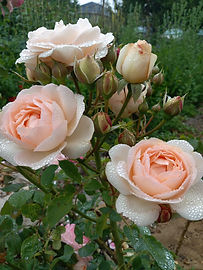Pollinator Pathway
Bothell



Songaia Community Garden
Songaia Community Garden (Stillaguamish, Duwamish, and other Coast Salish Territory) The Songaia Garden was founded in the late ‘80s and exists now as a learning garden above all else. We strive to create a space where humans can learn to grow food sustainably, care for and regenerate soil health, participate in their surrounding ecosystems, and bolster their personal and community resilience for the times to come. The food produced in the garden and orchards feeds into our community meals program, reducing our impact and our reliance on global food systems. More information about our summer intern program and volunteering can be found at http://www.songaia.com/internships.html . Check out our blog http://www.songaia.com/the-garden-blog to understand the intern experience. The garden includes a large collection of heirloom roses.
22401 39th Ave SE, Bothell, WA 98021



Songaia Native Forest Garden (Stillaguamish, Duwamish, and other Coast Salish Territory)
The Songaia Native Forest Garden was planted in 2022 in collaboration with the Natural Resource Conservation Service (NRCS) and local indigenous educators Linzie Crofoot and Tayna Greene. This forest garden consists of plant relatives that are of cultural significance to the Coast Salish peoples. The Miyawaki Method of afforestation was implemented in this space with the support of our local community and UW Bothell students. We are one of the first restoration sites in Washington to incorporate composted human remains into our soils (Rest in peace, Jim).
22401 39th Ave SE, Bothell, WA 98021



Songaia Medicinal Garden (Stillaguamish, Duwamish, and other Coast Salish Territory)
The Songaia Medicinal Garden, or “Herbal Gerbil Garden” was founded in 2020, with the intention to create a space of learning and experimentation for growing medicinal plants. Since that time, many medicinal species have been introduced to the garden, many of whom have been made into medicines and teas that support the health of our community. We continue to cultivate our relationship to these plants and our understanding of their properties.
Everyone in Washington is welcome to join the Pollinator Pathway NW. We are initially focusing our efforts in the Sammamish Valley region but hope to include all of Washington, other states in the Pacific Northwest and British Columbia as we move forward with habitat creation.
Take the pledge to maintain a healthy, natural landscape and make your garden a pollinator habitat. Stop by 21 Acres and buy a yard sign that proclaims your commitment to our pollinators!
The Pollinator Pathway Pledge:
Grow a variety of pollinator friendly plants that bloom from Spring through Fall.
Plant native flowering trees, shrubs and wildflowers.
Avoid using chemicals, especially insecticides and herbicides.
Talk to my neighbors about the importance of pollinators and their habitats.
Click here to add your garden or project to the Pollinator Pathway NW.



